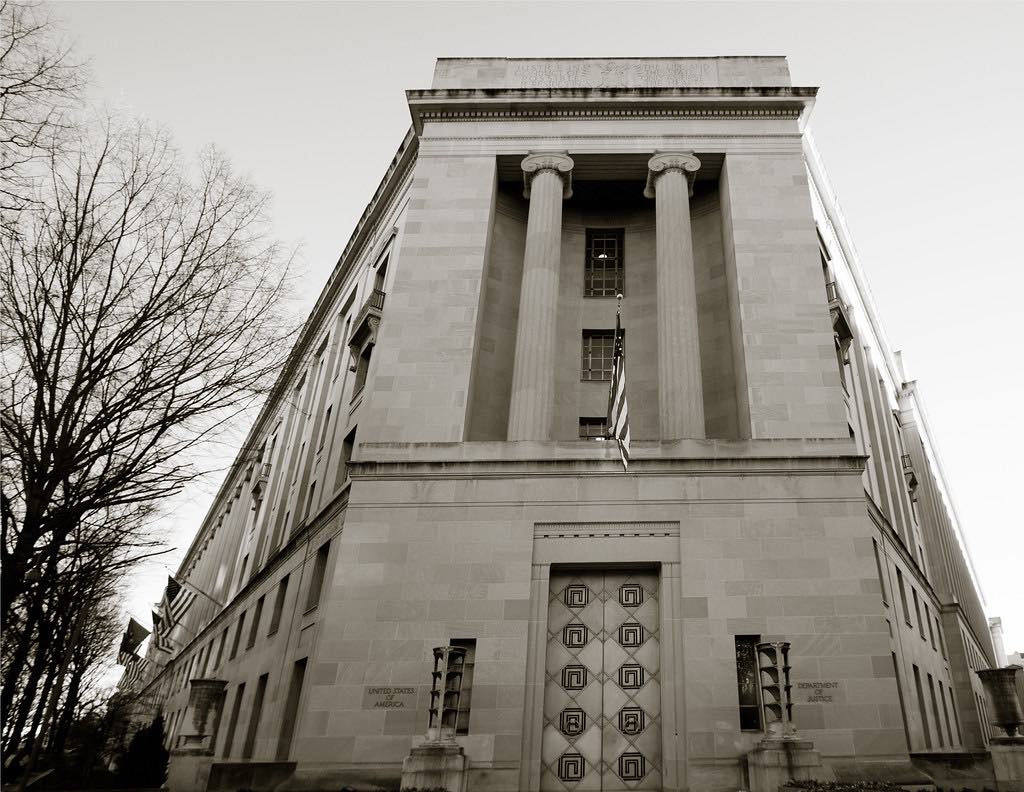The President Tweets and the Justice Department Complies
The Justice Department’s handling of the sentencing of Roger Stone and Michael Flynn gives reason to worry about how Attorney General Barr will handle allegations against the Biden family.

Published by The Lawfare Institute
in Cooperation With

Corruption of the justice system has two major elements. The first—at issue in the Ukraine scandal—is the use of state power to go after one’s enemies. The other is the ability to restrain government power to reward one’s friends and allies.
A dramatic display of this latter power took place today, Feb. 11, when the U.S. Department of Justice, having articulated in court its view of an appropriate sentence for President Trump’s associate Roger Stone—convicted recently on multiple felony counts—confronted an angry presidential tweet and then meekly reversed course in a second filing.
The action prompted multiple career prosecutors to withdraw from the case.
Only yesterday afternoon, when the Justice Department filed its sentencing memorandum in the Stone case, its position with respect to Stone was clear. As provided for by the federal sentencing guidelines, the department recommended a sentence of 87 to 108 months in response to Stone’s conviction for conduct prosecuted during the Mueller investigation. It asserted that its recommendation was “consistent with the applicable advisory Guidelines” and “would accurately reflect the seriousness of [Stone’s] crimes and promote respect for the law,” and further argued that:
Investigations into election interference concern our national security, the integrity of our democratic processes, and the enforcement of our nation’s criminal laws …. It is against this backdrop that Stone’s crimes—his obstruction, lies, and witness tampering—must be judged. Stone knew the gravity of the House Intelligence Committee’s investigation when he obstructed it by giving false testimony and tampering with a witness. Indeed, Stone acknowledged as much in his opening statement before the Committee. Stone chose—consciously, repeatedly, and flagrantly—to obstruct and interfere with the search for the truth on an issue of vital importance to all Americans.
Prosecutors also argued that Stone’s threats of violence against Russia investigation witness Randy Credico and Credico’s dog warranted an enhanced prison sentence under federal guidelines—regardless of the likelihood of Stone following through on that threat. And, they argued, Stone “displayed contempt for this Court and the rule of law. For that, he should be punished in accord with the advisory Guidelines.”
That was yesterday.
Then, in the early hours of the morning, President Trump tweeted that the 87-to-108-month suggestion was “horrible and very unfair”:
This is a horrible and very unfair situation. The real crimes were on the other side, as nothing happens to them. Cannot allow this miscarriage of justice! https://t.co/rHPfYX6Vbv
— Donald J. Trump (@realDonaldTrump) February 11, 2020
In the wake of the president’s tweet, everything changed. The Justice Department quickly did a U-turn, announcing that it found the sentencing recommendation “extreme, excessive, and grossly disproportionate.”
And so it was that, the day after it filed its first sentencing memo in Stone’s case, the government undercut itself and filed a second memo announcing that it had been grievously wrong the first time around.
The government’s new memo stated that the sentencing range it had advocated only the day before “would not be appropriate or serve the interests of justice in this case.” Stone, after all, is of “advanced age,” and the department judged it uncertain whether his conduct involved threatening to “cause physical injury,” as the guidelines calculation assumed. Instead, Assistant U.S. Attorney John Crabb Jr. wrote, “the government defers to the Court as to what specific sentence is appropriate under the facts and circumstances of this case.”
In the hours before the Justice Department filed the memo with the court, all four of the assistant U.S. attorneys who had brought Stone’s case to trial removed themselves from the case—and one resigned from the Justice Department altogether. The four, after all, had signed on to the previous document, in which they advocated for exactly the sentence that the second memo now declared “would not be appropriate.” Having had the department pull the rug out from under them in an obvious capitulation to direct presidential pressure, they apparently concluded they should not proceed further.
How direct was that presidential pressure? In a news conference, Trump declared that though he had the “absolute right” to discuss Stone’s case with the Justice Department, “I didn’t speak to them. I thought the recommendation was ridiculous …. We’ll see what goes on there.”
But, of course, the president didn’t need to speak to the Justice Department. He had spoken to the entire world.
Meanwhile, Justice Department spokeswoman Kerri Kupec told the Washington Post that the department had decided to overrule the previous memo even before the president’s tweet. And later in the evening, ABC News reporter Alex Mallin tweeted that “[a] senior DOJ official this evening said ‘it does appear’ the withdrawals of the prosecutors in the Stone case were in protest to DOJ’s reversal. The official continued to insist the president’s tweet played no role in the reversal, calling it an ‘inconvenient coincidence.’”
Perhaps. We don’t know exactly what might have gone on within the Justice Department during the hours between when the first Stone memo was filed and when the department decided it had made an egregious error. But it is highly irregular for the department to act as it did today, intervening to overrule career prosecutors to urge leniency for a presidential friend. To act as it did in the immediate wake of a presidential statement decrying the handling of the case and in the face of the withdrawal from the matter of the prosecutors in question creates a heavy presumption of irregularity.
Nor is this the first time that the Justice Department has backtracked on a sentencing recommendation in a high-profile Mueller-related case. In December 2018, nearly two years after former national security adviser Gen. Michael Flynn pleaded guilty to lying to the FBI regarding his contacts with Russian officials prior to the Trump inauguration, the special counsel’s office filed a sentencing memo suggesting a downward departure from the zero to six months of prison time recommended by the guidelines—meaning that Flynn would get no custodial sentence at all. Flynn, the prosecutors argued, had accepted responsibility for his actions and was providing “substantial assistance” in other federal criminal investigations—which we learned later included both the special counsel’s investigation and an investigation into Bijan Rafiekian, a former business associate of Flynn’s.
A little over a year later, things had changed. Flynn had dropped the lawyers who saw him through the guilty plea and an affirmation of that plea before Judge Emmet Sullivan in favor of Sidney Powell, an attorney who had harshly criticized the Mueller investigation. Thereafter, disagreements between Flynn’s legal team and the prosecutors led the government to cease cooperation with Flynn in the Rafiekian case. In several filings over the course of the fall, Flynn, through his counsel, changed his tone on the original guilty plea, calling the original interview in which he lied to federal investigations an “ambush” orchestrated by high-ranking FBI officials “not for the purpose of discovering any evidence of criminal activity … but for the purpose of trapping him into making statements they could allege as false.”
On Jan. 7, 2020, the U.S. Attorney’s Office for the District of Columbia, which had taken over the case from Mueller’s office, filed a supplemental sentencing memo recommending—in light of Flynn’s turnabout—that the judge abide by the range and sentence Flynn to up to six months in jail. “Given the serious nature of the defendant’s offense,” argued the prosecutors, “his apparent failure to accept responsibility, his failure to complete his cooperation in—and his affirmative efforts to undermine—the prosecution of Bijan Rafiekian, and the need to promote respect for the law and adequately deter such criminal conduct,” a sentence within the guidelines was warranted.
Three weeks later, however—after Flynn’s counsel filed a motion to withdraw his guilty plea, alleging “bad faith, vindictiveness, and breach of the plea agreement” on the government’s part—the Justice Department backed away from its harsh account. Instead, in a supplemental sentencing memorandum, the department argued that while “a sentence within the Guidelines range of 0 to 6 months of incarceration is appropriate and warranted in this case, [the government] agrees with the defendant that a sentence of probation is a reasonable sentence.” Although the new memo asserted that the allegations made in Flynn’s motion to withdraw his guilty plea were false and that the government had “responsibly exercised its discretion to withdraw its motion for a downward departure,” it did not explain why the department had softened its position and was suddenly not opposing Flynn’s request for probation.
Both Flynn’s and Stone’s cases are up in the air. Judge Sullivan has postponed Flynn’s Feb. 27 sentencing hearing. Stone’s sentencing is currently scheduled for Feb. 20, when we will see how Judge Amy Berman Jackson responds to the Justice Department’s reversal, which in no sense binds her.
The department’s supplemental memo in the Flynn case seemed puzzling and concerning at the time. Stone’s case, though, represents an unambiguous instance of political interference in the Justice Department’s handling of a specific case—one that tends to cast the earlier incident in the worst light. It certainly looks like the Justice Department has twice changed its position in order to call for lighter sentences for associates of the president who were convicted in the course of an investigation Trump recently called “bullshit” and toward whom he has expressed sympathy.
All of this gives reason to be concerned about another recent development at the Justice Department: the process that has been reportedly created for individuals, including presidential lawyer Rudy Giuliani, to give information to the government regarding alleged conduct by the Biden family in Ukraine. This is the other major means of corrupting justice. It’s not protecting friends but arraying government power against enemies.
It involves, of course, the material whose investigation Trump was seeking in his phone call with the Ukrainian president that ultimately led to his impeachment. Having failed to get the Ukrainian government to announce an investigation of the matter, Giuliani is now seeking to get the Justice Department to do so. And the Justice Department is apparently receiving the material.
Here is what we know: On Feb. 9, Sen. Lindsey Graham said that the department had “created a process that Rudy could give information and they would see if it’s verified.” The next day, when asked to elaborate on Graham’s comment at an unrelated press conference, Attorney General William Barr said the department had now established an “intake process in the field” for “all information that comes to the department related to the Ukraine, including anything Mr. Giuliani might provide.” The Washington Post later reported that the process would route information through the U.S. attorney’s office in Pittsburgh.
This reporting creates more questions than it answers. On the one hand, the notion that the Justice Department would continue to receive information related even to the discredited allegations about the Biden family is unremarkable. Both the Justice Department and the FBI routinely accept information from all kinds of sources about possible crimes and then vet that information to determine if further action is appropriate or not. As Barr noted at the press conference, the department has an “obligation to have an open door to anybody who wishes to provide us information that they think is relevant.”
Had he left it at that, there might be little cause for additional concern. But Barr’s comments, and the later reporting, are not describing business as usual. And the range of explanations runs from the benign to the extremely abusive. In light of the Justice Department’s conduct in the Flynn and Stone cases, it’s reasonable to be concerned about its conduct here too.
Let’s start with the nonnefarious possibilities. After the Justice Department’s inspector general criticized the absence of guidelines concerning the handling of politically sensitive investigations, Barr announced that he would personally approve any decision to open an investigation into a political candidate. Given Joe Biden’s presidential campaign, matters related to Ukraine would fall within the category—so if Barr is going to approve any decision to predicate an investigation, establishing a point of contact for such information isn’t crazy. And putting the point of contact in Pittsburgh, instead of at Main Justice, could help assuage worries over potential political interference and thus serve to bolster legitimacy by placing it at arm's length.
This is more or less how Attorney General Jeff Sessions handled the president’s insistence that the department investigate a selection of conspiracy theories about Hillary Clinton: Sessions designated the U.S. attorney for the District of Utah, John Huber, to oversee the matter, which allowed Sessions both to assure the president that he’d put a serious person on the matter and to effectively deep-six the conspiracy theories by running them through a process that screened out garbage. One would hope that Barr is doing something similar here, creating a process outside of Main Justice that will screen out the noise and uphold the department’s obligations while taking responsibility personally for any decision to open any investigation.
But there’s reason to worry that this is not what is happening—and the obvious politicization of the handling of the Stone case heightens the worry.
For one thing, Barr simply hasn’t earned the benefit of the doubt. Many commentators gave Barr the benefit of the doubt when he appointed John Durham, the U.S. attorney for the District of Connecticut, to look into the origins of the Russia investigation. But Barr had made highly inflammatory public comments on the subject even before he appointed Durham—and instead of relying on Durham’s reputation as a longtime prosecutor to bolster the legitimacy of such an inquiry, the attorney general then personally involved himself. When the inspector general determined that the Russia investigation had, in fact, been properly predicated, both Barr and Durham issued highly inappropriate public statements taking issue with the finding.
Then there’s the fact that the Justice Department has not announced any kind of similar “process” to handle information regarding any of the other current presidential candidates. There seems to be some kind of special process related—as far as we know—only to material concerning one candidate and only related to the specific matter on which the president has sought to force an investigation by Ukraine.
A special process could mean that there will be special scrutiny given to Biden and additional Justice Department resources devoted to examining material about him and his family—material that so far has not yielded an even colorable suggestion of criminality. This, in itself, is dangerous: As then-Attorney General Robert Jackson wrote, the nature of prosecutorial power is that the prosecutor with bad intentions can proceed not by “discovering the commission of a crime and then looking for the man who has committed it” but instead by “picking the man and then searching the law books, or putting investigators to work, to pin some offense on him.” This risk is present in part because, even many decades after Jackson wrote these words, the standard for predicating an investigation remains relatively low. Create a special process to receive dirt from the president’s lawyers on the Bidens, and you may well be able to receive enough material to go after the man you have picked for scrutiny.
It is too early to conclude that this is what is happening on the Biden matter. But given what happened in the Stone matter today, it is not too early to cast a wary eye.








